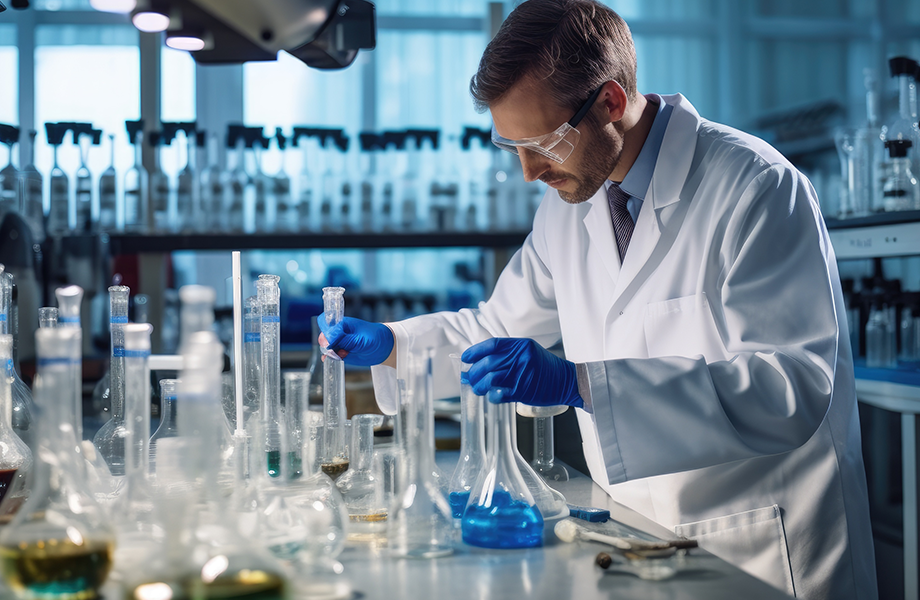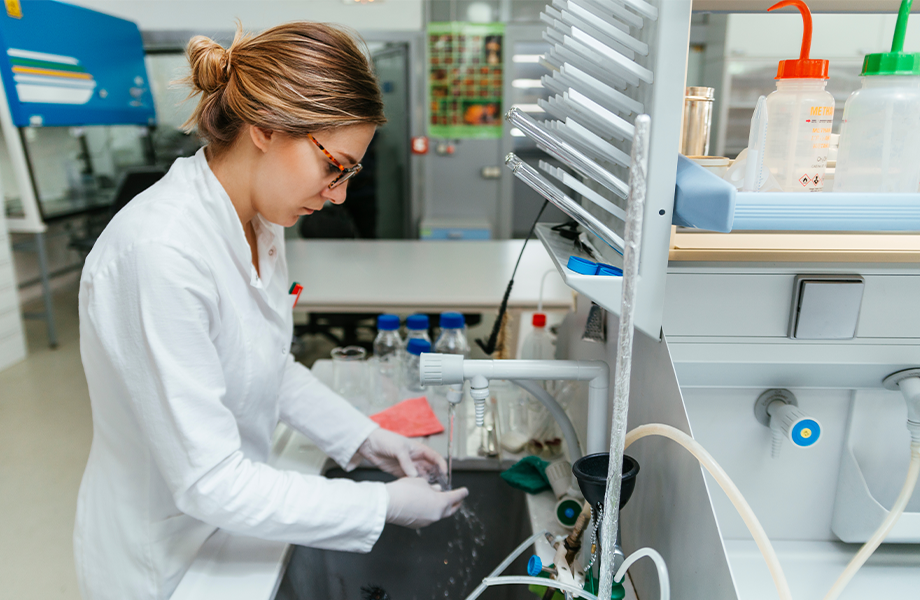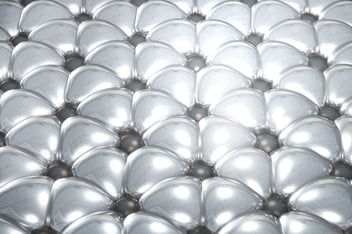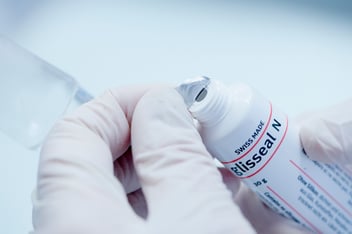阅读时间 15分钟。
Borer Chemie, 22. 九月 2023
Optimised cleaning processes in the laboratory save resources and costs
Focus on the safe handling of cleaners and occupational safety
Care should be taken when handling cleaning solutions, especially when cleaning manually. Occupational safety and thus the protection of employees is the main focus here. Working with cleaning concentrates and also ready-to-use cleaning solutions requires safe equipment such as protective goggles, work coats, suitable protective gloves and laboratory shoes. Even if a pH-neutral cleaner is used, appropriate protection must be ensured. Suitable accessories simplify exact and reproducible dosing.
If soaking baths are used, they must be labelled and covered when not in use. In practice, the integration of references to the appropriate protection in the work instructions has proven successful. These measures ultimately lead to safe working. When reprocessing laboratory utensils in a washer, the environment is well protected because the cleaning solution is used in a largely closed system. The correct connection of the concentrates to the dosing systems is essential. Mixing up generally alkaline cleaners and acidic neutralisers has a negative effect on the results and endangers occupational safety. Avoiding chlorine-based cleaners further increases safety, as chlorine vapours are harmful to health. Occupational safety is therefore also an important factor in protecting people and the environment.
Properly trained employees as a key factor in quality assurance
The professional cleaning of laboratory utensils undoubtedly belongs in the hands of qualified employees. They take care of maintaining order and cleanliness in the area of laboratory glassware cleaning on a daily basis. Order begins with the correct storage of cleaners and is also of great importance at the place of use. This prevents, for example, laboratory utensils that have already been cleaned from being confused with material that has been delivered for cleaning. Careful instruction, especially of new employees, in the execution and documentation of cleaning processes ensures consistent results. The regular exchange of information with clients allows potential difficulties to be identified and avoided in advance.
Proven structures, procedures and order in the workplace thus have a significant influence on the careful use of resources and increase the quality of the work done.
What factors minimise interruptions to the supply of analytically clean laboratory glassware?
If laboratory utensils are cleaned automatically, the washer is often the bottleneck. Regular maintenance and ongoing upkeep of cleaning systems are therefore key. Laboratory utensils are then cleaned in a reproducibly clean manner and can be continuously returned to the internal clients for renewed use. This can lead to a reduction in stockpiling, especially of laboratory glassware. The persons in charge of cleaning laboratory glassware are further instructed on how to proceed in the event of a malfunction of the washer. Rapid intervention prevents the stacking of dirty glassware. Keeping and checking the logbook for the cleaning system may allow major malfunctions and failures to be detected and avoided at an early stage. A daily check of the washer chamber is an important measure to detect possible defects in the process early on. If you have any doubts or questions, the manufacturer of cleaning equipment will be happy to help. Direct access to the manufacturer of the process chemistry is a great advantage. Customers thus have complete information on the cleaners used and are informed directly of any changes. A reputable, local supplier does everything in its power to ensure a high level of delivery reliability and thus enables continuous work. Working with local suppliers can have an impact on productivity and therefore profitability.
The quality of laboratory glassware cleaning is reflected in the results
Inexpensive cleaners often appear attractive at first glance. But what if ghost peaks of unknown origin suddenly appear in the chromatogram? This massively disturbs the highly sensitive analytics. Not infrequently, the reason can be traced back to insufficient laboratory glassware cleaning through the use of unsuitable cleaners. Care should be taken to ensure that the products used have been specifically developed for cleaning laboratory glassware. They also ensure residue-free cleaning with consistent and error-free analytical results due to their excellent rinsability.
When using laboratory glassware in the microbiology laboratory, the use of surfactants should be avoided as far as possible. Even the slightest surfactant residues can significantly disrupt cell growth. The cause often lies in the use of an unsuitable cleaner or in a defective cleaning process.
The reliability of the results is therefore significantly influenced by the cleaning of laboratory glassware. Of course, this must be gentle on the material. The focus is, for example, on the cleaning of graduated laboratory glassware or glass cuvettes for spectroscopy or measuring cells for multi-parameter analysers. Specially developed cleaners are gentle on the material and extend its service life, which is an important contribution to sustainable action.
Optimal laboratory glassware cleaning is also a plus for environmental safety
Professional cleaners consist of precisely defined ingredients that work synergistically. The design of modern products takes into account substances that are as environmentally friendly as possible and also considers the input into waste water and thus into the environment after use of the cleaning solutions. Cleaners formulated as high concentrates significantly reduce the ratio of product to primary packaging material as well as the effort required for transport and storage.
deconex® optimised cleaning processes in the laboratory: the formula for sustainable and economical cleaning of laboratory glassware without compromising on safety and quality
 We care about using resources responsibly and minimising costs. The formulations of our deconex® products are environmentally friendly and offer added value in terms of reliable cleaning results and occupational safety. Our eco-promises at a glance:
We care about using resources responsibly and minimising costs. The formulations of our deconex® products are environmentally friendly and offer added value in terms of reliable cleaning results and occupational safety. Our eco-promises at a glance:
- Safety in the workplace
An extremely effective contribution to sustainability and quality - Correct use of suitable cleaners in defined processes
Ensures quality, protects materials and increases occupational safety - Continuous supply of cleaners
Increases productivity, ensures supply security - Special cleaners for reliable results
Prevents introduction and carry-over of unwanted residues and false analytical results - Processes tailored to requirements and compliance with them
Ensures sustainable quality through situationally adapted use of resources - Modernn formulations take the life cycle into account
Dispensing with critical ingredients and formulating as high concentrates leads to a lower environmental impact
Would you like to learn more about our ecological deconex® laboratory glass cleaners and sustainable processes? Contact our experts.
You can also find further information in our brochure "Environmentally friendly solutions for clean laboratory glassware".


